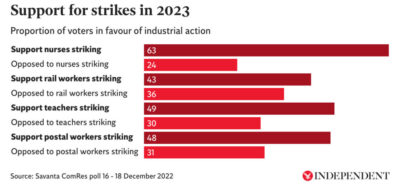The month of February has been jam-packed full of industrial action, with only seven days free of strikes in the calendar. Dubbed a new ‘winter of discontent’, this season has been one filled with industrial disputes spanning all sectors in the United Kingdom. From transport workers to primary school teachers, it appears as though there is a universal sentiment of dissatisfaction amongst the British workforces. But as sudden as the strike action may seem, there is plenty of evidence to suggest the contrary- that discontent amongst workers has been brewing for quite some time.
This latest wave of strikes began in the summer of 2022 as members of the RMT voted to strike over proposed changes to working conditions and wages. This decision triggered other railway unions to do the same and in June 2022 a wave of single-day strikes disrupted services across the country which operated at 20% their regular capacity. Workers in bus services and air transport also organised strikes over the summer as part of disputes also surrounding wages and conditions. It appears the somewhat successful action in the transport sectors incentivised other parts of the workforce to do the same in order to negotiate better pay. This could be the reason for the strikes in sectors which are seen to be well-paid e.g., barristers and even university educators partook in striking.
What needs to be understood about the strikes going on is that British workers, irrespective of sector, are struggling with current rates of pay which may have been satisfactory even a few years ago. Even with pay rises, wages are struggling to keep up with inflation rates of the country which was 10.1% in January 2023. Pay has gone up by an average of 6.4% in the UK in the past year, which means that real wages have fallen by an approximation of 4%. To add to this, the cost-of-living crisis the country faces with food and energy prices at peak levels over the past year has given rise to a struggling workforce in dire need of significant change.

The effects of strikes on the U.K. in the past year has been hard-hitting with everyday services being affected. Despite this, public support is convincingly strong, with a general sense that private companies and the government are to blame for failing to pay workers a suitable amount, although it seems as though this increasing pressure on government has done little to urge them into action. It may have spurred them in the opposite direction with the Strikes (Minimum Service Levels) Bill which prompted the ‘Walkout Wednesday’ strikes on the 1st of February across all sectors. The Strikes Bill was introduced to mitigate effects of striking and their impacts on the accessibility of public services, including health; education; transport; fire and rescue; and border security sectors.
The Bill demonstrates the lack of importance of the workers’ rights in the U.K., something which begs the question of whether the country’s integrity and democratic system is in peril. With many members of the public feeling as though this law would be infringement on the fundamental right to protest, this new legislation has sparked outrage- but not just nationally. Nine of the biggest trade unions in Europe have issued a joint statement deploring the ‘draconian’ and ‘anti-union laws’ of the U.K. government, stating that the Strikes Bill would ‘put the U.K. even further outside the democratic mainstream.’
It seems as though the strikes now represent something more than simply wanting a pay rise. With the pushing effort by government to restrict the right of workers to protest, the strikes reflect the increasing dissatisfaction of the people regarding the government and its seeming disregard for the wants of workers in the U.K. With the strikes not set to end as we head into March, we shall have to see what happens and what it means for this democratic nation.